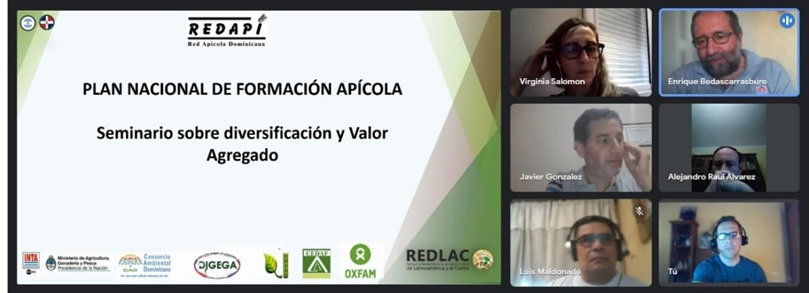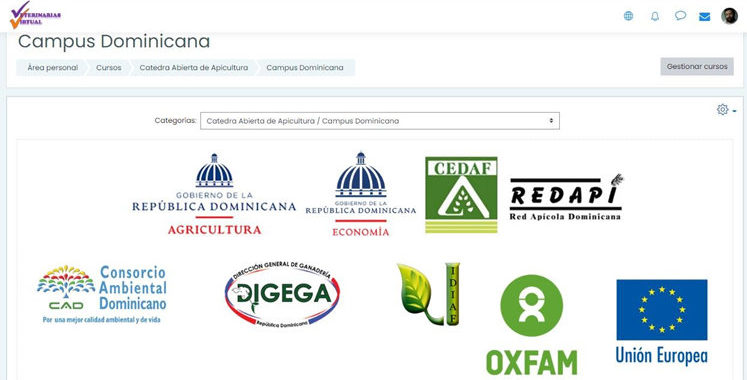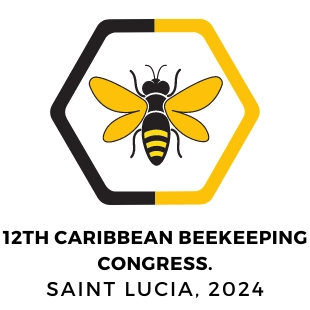Apicola National Training Plan in The Dominican Republic
The Plan is based on the capabilities of the team of the Dominican Beekeeping Network (REDAPI) reinforced by researchers from the National Beekeeping Program of the National Institute of Agricultural Technology (INTA-PROAPI) of Argentina based on the experience accumulated in the framework of the Latin American and Caribbean Network for the Development of Beekeeping and Family Farming (REDLAC-AF): https: //www.redlac-af.org) after 25 years of working together.
Through the financial support of OXFAM International within the framework of the Haiti Dominican Republic Binational Cooperation Program – Informal Trade Development
Component, it sought to combine the virtual capacities available in REDLAC from the Open Beekeeping Center with the experience of the Dominican team in Field Schools (ECAs) developed with beekeepers in all provinces. In this way, support is achieved for the Network of Territorial Technicians that the Field Schools teach in a more economical and efficient way.
The strategy implemented allows combining the scientific knowledge of a powerful research and development team (25 researchers from REDAPI and INTA – PROAPI participated) with the experience of the beekeepers themselves who learn by doing. We worked under the umbrella of Good Practices In The Spirits with the participation of government institutions: Directorates of Livestock and Agri food Safety of the Ministry of Agriculture and The Dominican Institute of Agricultural and Forestry Research (IDIAF); and non-governmental: Center for Agricultural and Forestry Development, Inc. (CEDAF) and Dominican Environmental Consortium (CAD) developing the following topics: Learning to work in the virtual classroom, Field Schools, Good Beekeeping Practices, Environment and Nutrition, Health, Productive management of the apiary adapted to climate change, Good manufacturing practices in extraction and processing rooms and Diversification.

In Field Schools, technicians and facilitators help beekeepers to “learn by doing”
27 sessions of Field Schools were held throughout the national territory, in which around 175 beekeepers and technicians participated.
The plan aims to develop the scientific foundations in virtual mode by convening a highly trained team that supports the territorial technicians so that they, through the ECA’s work in the territories the implementation of a technological path adapted to the conditions of each region in a context of climate change. The challenge is to achieve a virtual work team that allows feedback from the experiences of beekeepers, with the participation of technicians as chains of transmission between researchers/ specialists and territories.
Within the Open Chair of Beekeeping / Virtual Veterinarians (INTA Agreement – UNICEN https://virtual.vet.unicen.edu.ar/course/index.php?categoryid=12) the “Dominican Campus (Figure 1) was developed with a Secretariat where the team responsible for the project worked on all aspects related to planning and execution, elaboration of protocols for ECA’s etc.

Figure 1.- Dominican Campus in Virtual Veterinary Medicine of the National University of the Center.
Within the Dominican Campus, the classroom “Continua Training of Dominican Technicians and Facilitators” was created, where 82 technicians from institutions that offer support to beekeeping and members of the REDAPI and INTA PROAPI team involved in virtual training were enrolled; in which synchronous and asynchronistic activities were developed.

Figure 2. Screenshot of the Seminar on Diversification.
All the seminars were recorded in the classroom for asynchronous consultation and for each one a forum for analysis and debate was implemented.
At the end of the activities planned for 2021, a survey was implemented for the Technicians/Facilitators and another for the Beekeepers that showed a high level of conformity on the part of all the participants. All expressed their interest in continuing to work with the modality implemented.
Undoubtedly, the combination of virtuality with face-to-face training for beekeepers through Field Schools generates an important synergy in the knowledge management process and shows great potential in the process of territorial development (especially in the case of territories that do not have a critical mass in research and knowledge generation). The strategy allowed progress in the consolidation of an international team, highly qualified, at a reasonable cost, with the capture of experience and the protagonism of those involved in the territory.
The capacities and learnings generated can make it possible to respond to requests for assistance from other countries in Central America and the Caribbean.


